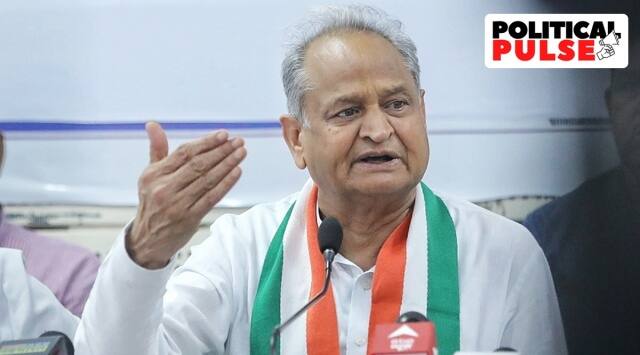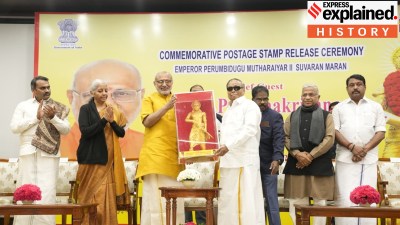Rajasthan govt tables Bill to guarantee minimum income
The Bill largely covers three broad areas: Right to Minimum Guaranteed Income, Right to Guaranteed Employment and Right to Guaranteed Social Security Pension.
 First announced by Chief Minister Ashok Gehlot in his budget speech earlier this year, the Bill is part of a bouquet of schemes and measures undertaken by his government to provide relief to citizens from inflation with an eye on polls later this year.
First announced by Chief Minister Ashok Gehlot in his budget speech earlier this year, the Bill is part of a bouquet of schemes and measures undertaken by his government to provide relief to citizens from inflation with an eye on polls later this year. AIMING to support individuals and households of the state with an “additional income”, the Ashok Gehlot government on Tuesday tabled the Rajasthan Minimum Guaranteed Income Bill, 2023.
The Bill largely covers three broad areas: Right to Minimum Guaranteed Income, Right to Guaranteed Employment and Right to Guaranteed Social Security Pension.
First announced by Chief Minister Ashok Gehlot in his budget speech earlier this year, the Bill is part of a bouquet of schemes and measures undertaken by his government to provide relief to citizens from inflation with an eye on polls later this year.
The Right to Minimum Guaranteed Income under the Mahatma Gandhi Minimum Guaranteed Income Yojana or MGMGIY, as the scheme brought under this Act will be called, states that the state government shall provide to eligible persons a minimum guaranteed income through this scheme by providing employment in urban areas through the Indira Gandhi Urban Employment Guarantee Scheme (IGUEGS) and in rural areas through Chief Minister Rural Employment Guarantee Scheme (CMREGS) or by providing pension to an eligible category of old age/specially abled/widow/single woman.
As for Right to Guaranteed Employment, every adult person residing in the rural areas of the state shall have a right to get guaranteed employment for doing permissible work of at least additional 25 days in a financial year on completion of maximum days of work as prescribed by the MGNREGA, and to receive minimum wages weekly or in any case not later than a fortnight. Next, for urban areas, every adult person of the state shall have a right to get guaranteed employment for doing permissible work of at least 125 days in a financial year and to receive minimum wages weekly or in any case not later than a fortnight.
In case the Programme Officer fails to provide employment within 15 days from the receipt of the application in the prescribed manner, the applicant shall be entitled to receive unemployment allowance from the state government on a weekly basis and in any case not later than a fortnight.
The Right to Guaranteed Social Security Pension entitles every person falling in the category of old age/specially abled/widow/single woman, with prescribed eligibility, to a pension. An important component of the pension would be an automatic increase of 15 per cent annually on the base rate in two instalments i.e., 5 per cent in July and 10 per cent in January of each financial year, starting from financial year 2024-2025.
The government anticipates an additional expenditure of Rs 2,500 crore per year due to the scheme, which may increase with time.
Last week, at an interaction with social security pension beneficiaries, CM had said, “When the government gives you Rs 1,000 it is not a favour. The one who rules has a moral responsibility that everyone gets justice. And we are bringing in a law so that no one can stop the pension.”
Social activist Nikhil Dey of the Mazdoor Kisan Shakti Sangathan (MKSS) which had shared a draft of the Bill with the state government, said, “The Bill contains many firsts in the country. It is a very welcome step. We’re really happy that it has come, especially since it has all the essentials.” He said that the approach of the Bill guaranteeing minimum employment and pensions by law distinguishes it from the cash transfer schemes that various other states have been provisioning. While the civil society network, the Soochna Evum Rozgaar Adhikar Abhiyan, had submitted a more detailed draft to the government, Dey says that parts which have been skipped can still be included in the rules brought under the Act.
During the announcement in his budget speech earlier this year, Gehlot had said that Mahatma Gandhi’s message, “The true measure of any society can be found in how it treats its most vulnerable members” is a focal point of all his government’s policies.
“We believe that social security is the right of deprived sections of the society. For this, social security schemes were implemented by our UPA government at the Centre through Rights-based Laws such as MNREGA, RTE and Food Security Act. Due to such policies of the Central Government under the leadership of Dr Manmohan Singh, the common man was saved from the brunt of the global recession at that time,” the CM had said.
While the state government provides social security pension to over 90 lakh beneficiaries at an annual expenditure of about Rs 9,000 crore, the Central Government is providing Rs 300 crore annually by giving Rs 200/300 per month to 10 lakh persons in the state. Since the status of social security schemes including pension is different in all the states, Gehlot has, on various occasions, said that he has suggested to the central government to make arrangements for uniform implementation of social security schemes for the entire country by bringing in laws.
- 01
- 02
- 03
- 04
- 05































